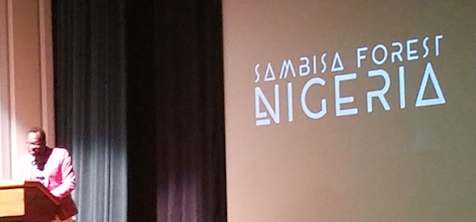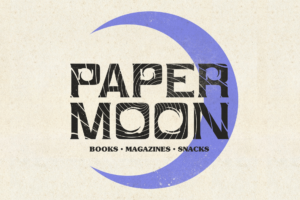by Jeff Doherty
Evan Narcisse co-authored the comic series “Rise of the Black Panther”, along with Ta-Nehisi Coates; the culmination of a long journey Narcisse has been on since he was young. He has developed from fan, to critic, and now to a creator who has contributed to the long legacy of his favorite superhero, Black Panther. He spoke to a live audience about the history of Black Panther, and the writing that preceded the blockbuster hit. He also commentated on the film as it played and contextualized some of the hidden aspects that could be overlooked.
Narcisse was quick to point out the odd reality of Black Panther; he was created by Jack Kirby, and Stan Lee. These two middle aged Jewish men were interested in making a character that conveyed the idea of an African society that was never colonized. One of the draft names for Black Panther was Coal Tiger; this term had emerged in the 60s and 70s to describe African nations that prospered off of natural wealth. Of course, Coal Tiger didn’t survive the draft room, and many of the stereotypes assigned to black characters at the time were cut away from Black Panther. Narcisse also pointed out that “every black creator [who worked on Black Panther] changed the texture” of the greater story of Black Panther.
As a side note, Narcisse described the easy to see difference between Marvel and DC. Marvel often had a larger, interwoven universe that allowed for many of their characters to cross paths regularly. While DC had standalone heroes, who sometimes united for some specific adventure.
Narcisse put the spotlight on his background and his work. When he was hired by Marvel to write Rise of the Black Panther he realized his knowledge garnered his reputation as a comic nerd, and as a critic he was ready to be put to the task. He had the opportunity to flesh out the history of Black Panther and found his vision (along with that of Coates) was about the deeper history of Wakanda tribe. From the tribe’s roots to the vibranium powered future lives of Wakandans: “I knew that story had never been told,” Narcisse said, and he told it with his unique opportunity.
When it came to the storyline for Black Panther, Narcisse drew on his Haitian heritage which involved equal parts pride and a sense of isolation, just like the Wakanda. He was often advised by his family to follow old Haitian traditions; despite the fact that the traditions were often out of step with modernity. This was an aspect he wove into his tale of the Wakandan society, and as he points out the movie also draws upon a similar theme.
When Narcisse went to the commentary section of the talk he accentuated the hidden themes, and symbolism told throughout Black Panther via director techniques. From the tri color outfits worn by T’Challa and company during the casino fight (representing afro-nationalist colors), to the royal houses of Wakanda vying for power through combat (as a representation of afro-diasporic communities clashing with one another), Narcisse illuminated the deeper decision making behind the movie.
Although Narcisse himself says that the movie “tells its own story,” one conflicting aspect from the story he and Coates wrote is that Black Panther is Narcisse’s favorite superhero because he identifies Black Panther as a hero. Someone to look up to and aspire to be. When his daughter (who accidentally called him during his talk) spoke over that phone microphone, he wasn’t Evan Narcisse the writer, the critic, the nerd; you could tell he was her hero, just as he is, Evan Narcisse the ordinary man, and I could identify with that.





